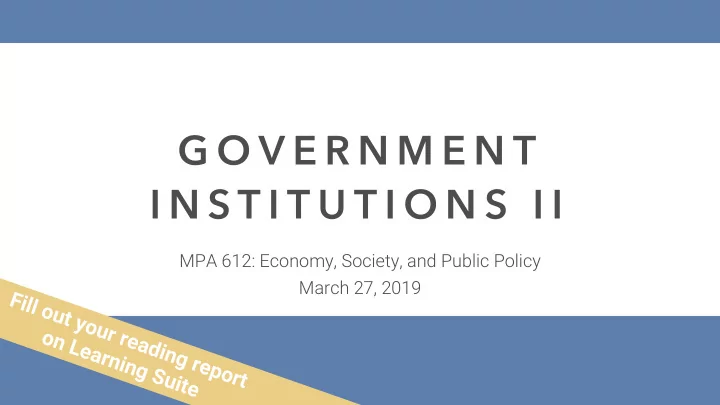

G O V E R N M E N T I N S T I T U T I O N S I I MPA 612: Economy, Society, and Public Policy March 27, 2019 Fill out your reading report on Learning Suite
P L A N F O R T O D A Y Governments in the economy Democracy Limits of governments
Talk like an economist Final project Groups: yea or nay? Exam 3
G O V E R N M E N T S I N T H E E C O N O M Y
What do governments do in the economy?
S P E C I A L F E A T U R E S O F G O V E R N M E N T S Only actor allowed to use legitimate force Only actor with civil and human rights obligations to its citizens
T W O P O S S I B L E G O A L S Maximize surplus (efficiency) Ensure fairness
Y A Y G O V E R N M E N T S Governments can use public policy to fix inefficiency and unfairness Incentives Regulation Persuasion and information Public provision
B U T W A I T ! An organization with the power to address efficiency and fairness can also do great harm
“With great power comes great responsibility” Peter Parker’s Uncle Ben
B O O G O V E R N M E N T S Use of force to silence opponents Rent seeking, oligarchy, and self-enrichment
L I M I T S O F G O V E R N M E N T S Well-governed societies place limits on government power Elections Constitutional restrictions
D E M O C R A C Y
T H R E E K E Y I N S T I T U T I O N S Rule of law Civil liberties Inclusive, free, and decisive elections
What makes these different?
L I M I T S O F G O V E R N M E N T S
F A I L U R E S Market failure Prices don’t reflect individual actions + allocation of resources isn’t Pareto efficient Government failure Failure of political accountability
“With great ability comes great accountability” Miles Morales’s father, Jefferson Davis
G O V E R N M E N T F A I L U R E S Economic infeasibility Administrative infeasibility Political infeasibility
E C O N O M I C I N F E A S I B I L I T Y Public policy must be a Nash equilibrium to be successful
A D M I N I S T R A T I V E F E A S I B I L I T Y A policy might be adopted if there’s not enough state capacity Limited information Limited capacity (This is why you’re here!)
P O L I T I C A L F E A S I B I L I T Y A policy might not be adopted even if it’s great and there’s sufficient state capacity Short-termism Unequal access Voting
P O L I T I C A L F E A S I B I L I T Y Short-termism Implement policies that get you elected next cycle
P O L I T I C A L F E A S I B I L I T Y Unequal access The rich can have a louder voice Peanut butter
V O T I N G Policy Anil Bala Carlos (1/2, 1/3, 1/6) X 1 2 3 (1/3, 1/6, 1/2) Y 2 3 1 (1/6, 1/2, 1/3) Z 3 1 2 X > Y Y > Z Z > X Condorcet paradox Vote intransitivity
V O T I N G Order of voting matters! Speaker of the House (or whoever’s in charge of the agenda) could theoretically guarantee any outcome Arrow’s Impossibility Theorem
A L T E R N A T I V E V O T I N G S Y S T E M S ? https://www.youtube.com/watch?v=_5SLQXNpzsk Ranked choice / Instant runoff Encodes more information in vote + changes campaign calculus Still suffers from Condorcet paradox
M AT H P R A C T I C E !
The US can produce 14 billion bushels of corn and 443 million bushels of rice China can produce 8 billion bushels of corn and 7.7 billion bushels of rice Who has absolute advantage? Who has comparative advantage? What price of rice/corn would be advantageous? What would combined PPF look like
Recommend
More recommend